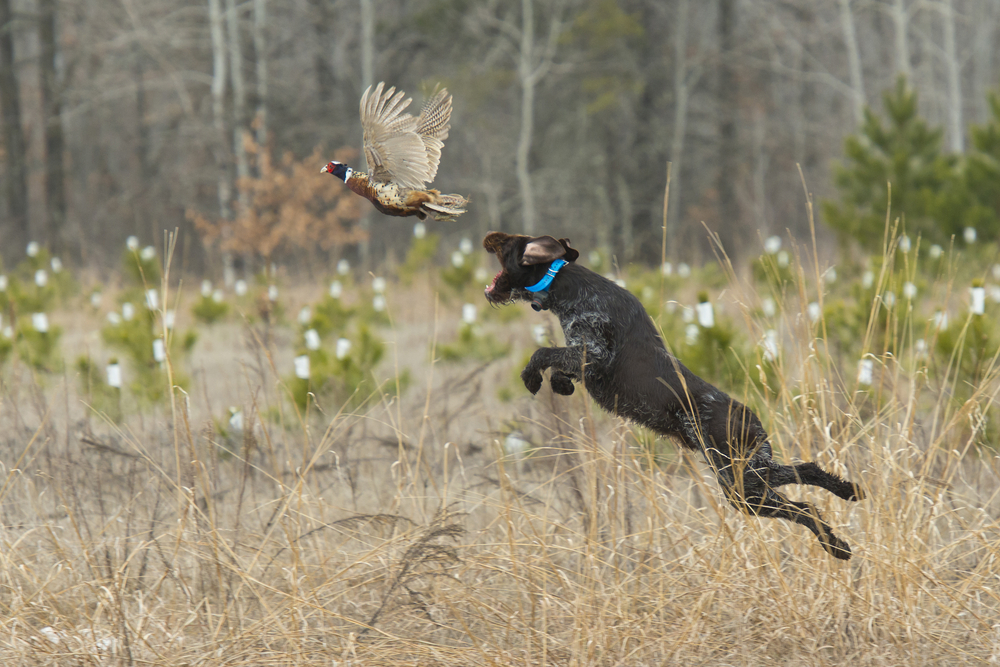The crisp air and colorful foliage make fall one of the most stunning seasons in Austin, Texas. However, as the leaves change, so do the outdoor activities, and for many Texans, hunting season is ramping up. While hunting enthusiasts look forward to this season, the sport poses safety risks to pets, even if you and your pet don’t participate. To help your pet avoid injury, you must take extra safety precautions before they enjoy the outdoors during this time of year. Learn how to keep your furry pal safe by reading our Star of Texas Veterinary Hospital team’s tips to hunting season pet safety.
#1: Mark your calendar with your pet’s safety in mind
You can help ensure your pet’s safety before hunting season even begins by finding out when opening day is scheduled, and noting it on your calendar. Dates vary based on location and animal type, and the Texas Parks & Wildlife website posts this important information. Being aware of hunting season’s timeline in your area or places to which you may be traveling can help you plan for your pet’s comfort and safety.
By knowing whether hunters will be active in your area, you can manage your outdoor activities and prepare your pet for the potential stressors associated with this season. Always speak with your neighbors and local hunters to let them know where your pet usually plays. Hunters don’t want to harm pets, and your neighbors can keep an eye out for your pet to provide an additional safeguard. Clear communication and goodwill create a community in which everyone looks out for each other’s pets. This strategy is essential if you live near a hunting area.
#2: Add a pop of color to make your pet more visible
Before your pet ventures outside during hunting season, enhance their visibility by dressing them in bright, reflective clothing and accessories. If your pet goes out at night or before sunrise, equip them with a light-emitting diode (LED) collar or light-up tags, as these can be seen from a distance, especially in the dark. Hunting often takes place in the early morning or late evening hours when light conditions are low, and many pets’ natural-colored coats blend in with the surroundings, making it difficult for hunters to distinguish them from wild animals. When a light source, such as a headlamp or flashlight, lands on reflective material, it shines brightly, signaling to hunters that the animal nearby is a pet and not game. Moreover, most hunters recognize fluorescent orange and similar bright colors as universal signals that mean do not shoot. Dressing your pet in these colors provides an extra protective visibility layer, helping ensure they are clearly identifiable, and reducing their accidental injury risk during hunting season.
#3: Microchip your pet
Hunting season brings unfamiliar, loud noises, which may startle your pet and cause them to run away and become lost. If your pet is wearing a tag with your updated contact information, anyone who finds your pet can quickly get in touch with you. Ensure that your pet’s tags display your current contact information. If your pet isn’t microchipped, contact our Star of Texas Veterinary Hospital team to schedule this quick, safe procedure. A microchip provides your pet with permanent identification as it remains intact, significantly improving the chances of your pet being reunited with you should they run away and become lost. A collar, however, can slip off, and if your pet is not microchipped, you may never find them.
#4: Calm your pet’s nerves

Loud noises such as gunshots cause many pets anxiety, with about two-thirds of dogs having noise aversion, which exacerbates their fear reaction to sudden, unexpected loud sounds. Noise-averse pets exhibit an exaggerated, extended response to sounds, and may not settle down and behave normally again for hours. To help your pet cope with startling sounds during hunting season, designate a safe, quiet space in your home where they can retreat from the noise. Prepare your pet’s room by doing the following:
- Closing draperies and window shades to dampen outside sounds
- Including your pet’s favorite toy, blanket, and treat
- Playing soft, calming music to muffle the noise
- Wrapping your pet in an anxiety vest (i.e., ThunderShirt), which provides gentle pressure around their torso, decreasing stress
- Using pheromone sprays, such as Adaptil for dogs or Feliway for cats, to promote your pet’s wellbeing
- Providing a food-stuffed toy (e.g., Kong) for distraction
If your pet exhibits severe anxiety while trying to hide or escape from sounds, they may require sedation or anti-anxiety medication to prevent serious mental and physical harm during loud events. Your veterinarian can recommend the most effective product to alleviate your pet’s fears.
Pets face many hazards during hunting season. However, you can help your furry pal avoid injury by following our hunting season safety tips. In addition, during the fall, wildlife are on the move, carrying fleas, ticks, and pathogens nearby your home, so protect your pet from these pests by ensuring they regularly receive preventives. Before hunting season begins, schedule your pet’s microchipping or parasite check appointment with our Star of Texas Veterinary Hospital team.






